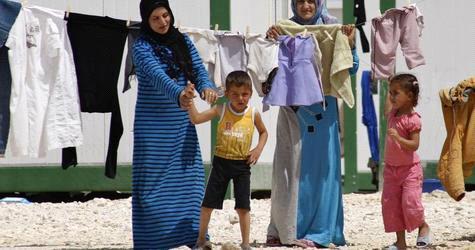Ammon News - AMMONNEWS - The crisis in Syria robbed Jordan of at least 1.1% of real GDP growth last year, according to latest estimates, as the influx of refugees put a strain on resources and border closures took a toll on trade.
The Jordanian economy could have grown by 4% last year, but the refugee influx and security challenges cut that figure to 2.9%. There are 1.3 million Syrian refugees in Jordan, or roughly 15% of the country's population, according to official estimates.
"Jordan faces dire economic conditions, including official unemployment figures hovering around 12%. The budget deficit, taking into account deficits due to energy subsidies, has reached 15% of GDP. These economic challenges are only exacerbated as the number of refugees rises," notes Marwan Muasher, vice-president at Carnegie Endowment for International Peace.
"The shift in the balance between Jordanians and refugees is exacerbating tensions between the two communities, particularly as they compete for jobs and scarce resources like water," Muasher said.
Rent inflation in Jordan shot up 7.7% last year, compared to estimates of 2.66% if the refugee crisis had not occurred. Overall inflation is up 3.31%.
The increased size of the population has resulted in a rise in overall imports. Non-energy imports are estimated to have increased by over 11% in 2013.
TRADE HIT
The International Monetary Fund said that the Syrian crisis has also taken a toll on Jordan's trade balance, with Amman forced to pursue more expensive routes via Aqaba port and Iraq, which is itself witnessing escalating violence.
"Because of the conflict, Jordan lost a major export route to Europe and other countries in the region. Indeed, during the first 11 months of 2013, combined exports to Lebanon, Turkey, and Europe dropped by 30% relative to the same period in 2012," the IMF said.
"Abstracting from mining exports, which have been facing difficulties unrelated to the Syria conflict, the severe contraction in exports that travel through Syria has resulted in a sizable moderation in export growth excluding potash and phosphate, exports grew by an average of a mere 0.7% per quarter in the two years up to 2013-Q3, down from an average of 3% in the previous two years."
Jordan's tourism sector appears to have recovered somewhat. The kingdom attracted 3.1% more tourists in the first quarter of the year, compared to the same period last year, according to The Ministry of Tourism and Antiquities.
However, Jordan's tourism sector was also broadside by the absence of Libyan tourists that traditionally came for medical treatment, but the figures dried up in 2013 as the North African country descended into chaos once again.
The country has embarked on new tourism promotion programs and is looking to attract tourists from markets as diverse as Pakistan, Africa and the Far East.
SHORT-LIVED GAINS
Jordan's effort to seek broad international support to help Syrian refugees saw an inflow of funds which helped cut its fiscal deficit to 5.6% of GDP at the end of last year, compared to 8.3% in the previous year.
"We believe these fiscal gains are likely to be short-lived as the 2014 budget envisages," said Citibank in a research note.
Several members of parliament have called for the government's resignation over plans to cut subsidies while at the same time expanding overall expenditure.
Citibank said total expenditure is expected to rise to JD 8.1billion, a 15% increase on 2013, leading to a deficit of JD 1.1 billion, or 4.5% of GDP.
"This is based on what we consider an optimistic assumption that revenues will rise in line with expenditures," said Citi. "On our more cautious view that revenues will come down from 2013 levels due to an expected fall in grants, we forecast a budget deficit of JD2.4bn, or 9.8% of GDP."
FOREIGN INVESTMENT
Jordan needs foreign investment and private sector growth to solve its unemployment problem.
"Looking forward, the employment challenge is daunting," warned the IMF. "To absorb the new entrants to the labor force, and abstracting from any future potential labor market pressures exerted by the Syrian refugees,
Jordan will need to increase employment by an estimated 403,000 full-time positions over 2013-2020."
Still, some progress is being made. Royal Dutch Shell Plc. Continues to pursue shell oil exploration in Jordan and is expected to invest around USD 800 million, Energy Minister Mohammad Hamed was quoted as saying by Jordan Times.
Investors from the UAE are keen on investing in projects worth USD 3.3 billion, according to government officials, while the World Bank is mulling a USD 1 billion loan to Jordan. In addition, the U.S. government underwrote Jordan's USD 1.25 billion bond issue.








 comment replay
comment replay 